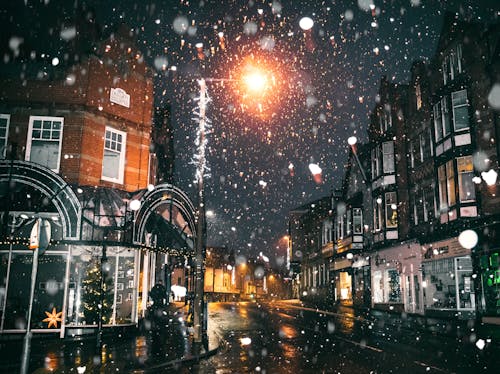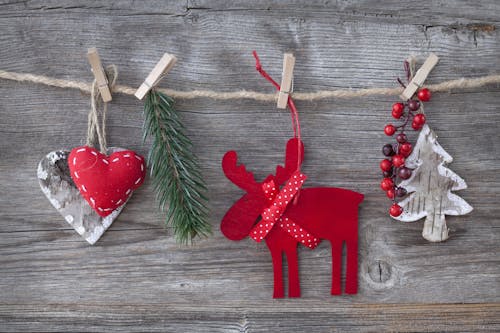
The winter holidays are a nostalgic time of year, and the holidays impact everyone’s mood differently. Many of us truly get into the holiday spirit, and experience ‘Christmas cheer’ as we decorate, shop, bake, plan holiday parties and visit family and friends.
According to author and happiness coach Nicole Fuentes, social connection and strong familial ties are some of the reasons that her hometown of Monterray, Mexico, was named one of the happiest places on Earth. The holidays give us a chance to reconnect with family members that we may not see during the rest of the year. The holidays also have us becoming more social with all the social events going on.
The social aspect of the holiday season can definitely boost our mood. However, not everyone’s experience is the same.
For some who are away from their family and friends, the holidays can be especially difficult, triggering feelings of loneliness, sadness and isolation.
Some people find that the holidays get them down. The holidays remind some people of what they’re missing in life, whether it be a romantic partner to spend the holidays with, or family members that have passed or live too far away.
Nostalgia can emphasize feelings across the spectrum of human emotions. If you are generally a happier person, your happiness might be emphasized during the holidays If you’re generally more prone to feelings of sadness, those emotions might be exacerbated during the holidays.
Let’s take a deeper look at some of the reasoning behind our many different moods around the holidays, and discuss what we can do to combat the ‘holiday blues’.
Holiday Cheer: ‘Tis the Season to be Jolly
The holiday season gives us a reason to celebrate, and celebration is a driving force behind what makes us happy. Some people have a happier mood during the holidays because they get to see family members who only visit at Christmas time, and love is in the air during the holidays. In addition to gathering with friends and family, many people partake in religious celebrations during the holiday season. We get to celebrate the end of another year and the clean slate beginning of a new one, and many of us get time away from work.
The primary reason for ‘holiday cheer’, however, comes from reminiscing about happy times we have already experienced. According to an experiment conducted by Danish researcher Brad Haddock in 2015, we do in fact have a ‘Christmas spirit’ network in our brains.
Haddock showed holiday-themed images to two groups of people. One group celebrated Christmas, while the other group did not. Several areas at the front of the brain, specifically those associated with spirituality and emotion, lit up in the group that practised Christmas traditions.
Because so many social events and gatherings take place during the holidays, those with plenty of social invites will likely get a boost in their mood this time of year. On that same note, if someone has plenty of people to love and be loved by, they’ll feel the warm fuzzies of love all around them during the holidays.
The holidays are also a time to give thanks, and many studies have indicated that time and time again, expressing gratitude is a major contributor to feelings of happiness, and can improve our mental health. The act of giving (a common gesture during the holidays) is also known to improve our mood.

The Holiday Blues
Some people notice that their mood is lower during the holidays. The winter holidays can be a stressful time. The planning and organizing take an exorbitant amount of energy, and holiday shopping also takes that financial toll on our bank accounts. Additionally, some people’s jobs are more stressful during the holidays, depending on what line of work you’re in. There is often mounting pressure to execute holiday campaigns and finish projects before the end of the year, making the holiday season an extra-busy time at work.
Unfortunately, that same nostalgia that makes some people happier can bring up feelings of sadness in others. Some people grieve more during the holidays if they’re missing a family member or close friend who passed away. Some people simply don’t have anyone to celebrate the holidays with.
If you’re without a romantic partner, seeing all the romantic holiday dates going on around you can make you feel extra lonely. If you don’t have a special someone to shop for, go on holiday dates with, or bring as your date to a Christmas party, you might find that the holidays negatively impact your mood.
Reflecting on the Year That’s Almost Over Can Either Be Mood-Boosting or Bring Up Feelings of Sadness
As the year draws to a close during the winter holidays, it can be a time of painful reflection, especially if you have experienced trauma this year or failed to accomplish what you hoped to accomplish this year. Try switching your mindset from reflecting on this past year to envisioning a great year ahead full of potential.
Some people feel happy when they reflect on the year that’s about to end because they had a great year. This is just one more reason why some people feel more cheerful during the holidays.
Are the Holidays Making You Feel Lonely, or is it Seasonal Affective Disorder?
Some people don’t have family nearby enough to visit during the holidays, and others simply don’t have family around at all. If you’re spending the holidays alone or away from family, feelings of isolation, loneliness and sadness can be amplified greatly during this time of the year.
Depending on where you live, the winter months can be an especially dark time, literally. Northern communities experience significantly less sunlight during the winter each year, and that can sometimes result in a form of depression known as Seasonal Affective Disorder or SAD.
If you’re blue during the winter holidays, you might have Seasonal Affective Disorder.
What is Seasonal Affective Disorder?
Seasonal Affective Disorder (or SAD for short) is a type of clinical depression that follows a seasonal pattern and occurs every winter.
SAD is linked to a loss of daylight that results in chemical changes in the brain that can bring on symptoms of depression including feelings of sadness, hopelessness, loneliness, lethargy and lack of motivation. SAD is most commonly diagnosed in adults in northern populations, and can even affect people who do not have a year-round history of depression.
The sleep hormone melatonin has been linked to Seasonal Affective Disorder. When it’s darker outside, our brains produce more melatonin, which makes us feel sleepy and lethargic. People who struggle with SAD often over-produce this hormone, and while melatonin itself does not cause SAD, too much of it tends to exacerbate symptoms.
Holiday-related stressors can trigger or worsen SAD, but it should be noted that Seasonal Affective Disorder is not the same as feeling sad around the holidays. It should be noted, however, that if you always feel extremely depressed during the winter holiday season, you might have Seasonal Affective Disorder, and not the ‘holiday blues’.
For one thing, the ‘holiday blues’, as the name would suggest, tend to go away once the holidays are over. SAD, however, tends to stick around throughout the winter season, and the symptoms are much more severe, often debilitating.
Your doctor or psychiatrist can help you figure out if you have the ‘holiday blues’ or SAD. If it’s the ‘holiday blues’ or ‘winter blues’, below are some tips to cope this time of year:

Tips to Combat the Holiday Blues
- Find Something to Celebrate. It doesn’t matter if it’s Christmas-themed or not, reflect on your year and find a reason to celebrate. If you’re spending the holiday season alone or away from family, create your own holiday, and ask yourself how you want to spend it.
- Keep Your Expectations in Check. Often, feelings of sadness or let-down are a result of unmet expectations. Too much exposure to social media is a driving force behind unrealistic expectations, so limit your time on Instagram if you’re already struggling. Remind yourself that what you see has been designed to look a certain way.
- Invest in Self-Care. This might mean seeing a therapist, but there are also a number of things you can do for yourself, like taking a walk, booking a spa day, treating yourself to a gift, surrounding yourself with loved ones or meditating.
- Get Active. Even if you live somewhere cold, there are a number of different activities you can do to keep active in the winter, and physical activity boosts endorphins, which can help you feel better.
- Decorate. The study done in Denmark proved that even just seeing images of holiday themes increased neural activity. Setting up and looking at Christmas decorations can trigger those same areas of your brain, the ‘Christmas Spirit network’, if Christmas traditions are part of your personal history. At first, it might seem silly to decorate your place for just you. However, this is a form of self-love and the ambience likely will improve your mood. If money is an issue, note that many thrift stores sell Christmas trees, Christmas lights, and other decorations at a great deal.
- Practice Gratitude. If you find yourself comparing your experience to others, one way to combat that is to create a gratitude list. Doing so shifts your focus away from what you don’t have and forces you to recognize what you do have. Check out this article on how to cultivate an attitude of gratitude.
- Give, Donate or Volunteer. Serving others is humbling and gives us a sense of purpose and belonging. The act of giving makes us feel good, and it’s also a great way to get involved, meet new people and increase our social connections. This will help you feel less alone. Giving and donating releases a flood of endorphins, specifically oxytocin, dopamine and serotonin, commonly referred to as the Happiness Trifecta.
Another option could be simply to opt out. There is no rule that says you must celebrate the holidays, and if the stressors are proving to be too much, you can choose to sit this year out.
Many factors contribute to your emotions around the holidays, including your genes. A DNA test from CircleDNA can let you know if you have a genetic predisposition to depression, which could make you more susceptible to Seasonal Affective Disorder in the winter. Armed with that knowledge, you can prepare yourself and make a plan of action to combat feelings of sadness.






